- Home
- Jennifer A. Nielsen
Resistance Page 4
Resistance Read online
Page 4
No problem.
I hoped.
Once Hanusia left, I waited for the train from behind a wide oak tree, on a night that had suddenly become far too lonely. I had no fear of the dark, but no love for it either. The moon would’ve made it easier to see had it not been dimmed by thick clouds, but I supposed not being seen was the whole point of our raid.
Right on schedule at 10:14 p.m., the train rounded a bend, its engine a steady hum, its bright headlight blinding me. At the last minute, Rubin had cautioned that Nazis could be on watch from platforms outside the trains.
“Whatever you do, don’t open a car next to one of those guards,” he had warned.
“How will I know which one has guards before I’m up on the train?” I asked.
“You won’t.” He gave my cheek a quick kiss, then added, “Just don’t get caught.”
With such encouragement in mind, I took a runner’s position, ready for the train to pass. I was aiming for one of the boxcars in the middle of the line, hoping not to see any guards there.
Hoping not to see guards anywhere at all. Or that, at least, they never saw me.
The engine passed first, then a passenger car. A single Nazi was indeed standing watch on a platform at the rear of it, but he was leaning on a railing, looking away from me. I let four more cars pass, then began running alongside the train, near a line of boxcars. My heart had already been pounding with anticipation, but that was nothing compared to now, running as fast as I ever had, trying to get close enough to a bar on the train doors. Cool wind smacked me across the face and the engine noises were all I could hear. If a soldier was shouting orders at me, I wouldn’t know.
My first attempt at grabbing anything attached to the door failed, but I did better with the car after that, taking hold of the bar and swinging my feet onto the thick metal rod that braced the car from underneath. So far, so good.
It was a trick to unlatch the door with only one hand, but I opened it enough to slide my body inside, then widened it a little more. Against the passing city lights, I checked my watch. 10:20. Only four minutes before the first drop.
It was too dark inside the car to read the writing on the boxes, so I opted for the heavier ones, figuring they were more likely to hold weapons or food.
Four minutes later, I pushed a box out of the car and watched it tumble down a hillside. I didn’t dare look out to see if Rubin was ready for it, or if anyone had seen what had happened, but I didn’t hear any whistles or shouted orders, and that gave me courage.
Exactly five minutes later, I did the same, but with two boxes, since they were lighter, and hoping Jakub was nearby. This was his plan. If I’d missed the mark, it was because he’d done his calculations wrong.
At the third drop, I rolled out the heaviest box yet, smiling as I did. Meriam had mentioned how strong she was. I figured she’d want to be tested.
Then I looked out for a safe place to jump. This was the part of the mission I’d dreaded most. Surely, I wasn’t the first person ever to jump from a moving train. Surely, they’d all survived it.
Or someone must have survived a train jump. Somewhere.
Hadn’t they?
As soon as the ground looked relatively soft, I closed my eyes, crossed my arms over my chest, and jumped. I hit the ground hard, scraping my elbows on the gravel beneath the surface and hoping the stinging was the worst of it. I rolled with the momentum and kept going until I was behind some bushes alongside the tracks.
That’s where Rubin and Meriam found me twenty minutes later. My arms were still across my chest, but at least my pulse was normal again.
“Are you all right?” Rubin asked, helping me to sit up.
“You said it’d be easy if I rolled,” I told him. “You said the ground would be soft from the fall rains.”
“Are you all right?” Meriam echoed.
“That depends.” My smile at them was hopeful. “What did we get from that train?”
“What did we get?” Meriam laughed. “My friend, we have one crate of canned stew, two crates of potatoes, and some military field supplies that should fetch a good price on the black market.”
I leaned back against the slope and tried to do the math. It was enough food for the residents of a single building in the ghetto for a single night. The field supplies might provide bribe money to obtain twenty blank identification papers, or to smuggle two or three children out of the ghettos.
“It isn’t enough.” I stood, determined to ignore the first aches of oncoming bruises. “When is the next raid?”
October 26, 1942
Krakow
Almost daily, Akiva continued to evolve, both in mission and in tactics. Gusta often spoke about how we should fear death—not for ourselves, but because death would shorten our mission.
When rumors began swirling in the ghetto about a coming deportation, Dolek found us a safe house outside the ghetto walls.
“It’s to protect us,” he explained, “and those inside the ghetto. If we’re caught, we can’t risk them being blamed for our actions.”
I had a reliable safe house ready in Krakow, used as a temporary stopping place for anyone we smuggled out, but Dolek chose an apartment nearer to the ghetto. That would serve as our new bunker, and just in time. Two days after we left, six thousand people were removed from the Podgorze Ghetto by train. Thankfully, my parents were spared.
This time.
There was another change too, one that affected my cell. Dolek took Meriam and a few other couriers with him on a trip north and returned with a new, fifth member for us, a girl named Esther Karolinski, who intently studied the floorboards as she mumbled, “I’ve never done resistance work before, but I can’t wait to learn.”
I arched a brow, deeply concerned. How could a girl who wouldn’t even look us in the eye be of use for what we had planned?
“Do you have any particular skills?” I asked her. When her only response was to stare blankly back at me, I added, “Can you pick locks? Aim a gun? Speak German?”
“I have a good memory,” she said, keeping her eyes on the floor. “And I can knit, though I’m sure that’s not what you meant.”
No, it wasn’t.
Esther was petite, with a shy voice, an uncertain smile, and every possible look and mannerism to radiate her Jewishness. None of us were perfect, but we all brought something of value to our jobs. I saw nothing in Esther that would help our cause, and plenty that endangered both her and us.
I immediately pulled Rubin aside into the small kitchen of our safe house. Esther was at the other end of the room, but although we whispered, she probably could hear me, and I didn’t care if she did. Akiva was not a nursery school for helpless young girls.
“If we get in trouble, will she knit us weapons to escape?” I said.
“You were a beginner once. We all were.” Rubin was far more patient than I ever was.
“I never lacked confidence like she does. And I was trained before I did my first mission.”
“We don’t have time to train that way anymore, Chaya. She’ll learn on the job.”
“If she can. Look at her.”
When I peeked back, there Esther was, sitting alone in the corner, jumping at every passing shadow and pretending not to hear our conversation—probably because then she’d have to defend herself. If she wanted to learn, then she should train in a cell with less dangerous work than ours.
“Dolek wants her to come with us,” Rubin said.
“I can do it,” Esther mumbled, still not looking at us. “Trust me.”
Rubin shrugged back at me, and the decision was made. No matter what I said or thought, Esther was coming.
Tonight, we left even later than the 10 p.m. curfew for Poles. The streets were watched at all times by Nazi soldiers, though Akiva knew their routes and routines. We took the quietest roads, the darkest alleys, and understood where to hide if we heard a whistle and an order to stop.
Rubin had a gun tonight, a Nazi Luger with on
ly three bullets in it, but we weren’t to use it unless we had no other choice. That was fine by me. Our cell’s mission was to steal supplies. Gunfire hardly helped keep us secret.
This time, we planned to raid a train station on the outskirts of Krakow. Several trains had come in during the day, but because of heavy rain, the Nazis were waiting until the following morning to unload them.
Rubin took the lead to get us into the station, then motioned us beside him. We hid behind a tree with gnarled roots that threatened to trip us every time we moved and with tendrils of branches that soaked us with dripping rainwater. But it’d take more than that to stop us.
I leaned out just far enough to count a small group of five Nazis clustered together beneath a metal overhang, the dim lamplight overhead converting their green uniforms to gray. The soldiers looked cold, but at least there they might stay dry. They should not have left their posts, but even if they had intended to monitor their assigned positions, the lure of casual conversation had apparently distracted them.
I briefly wondered what they were discussing. How much they missed home? How cold and wet they’d be when their shift ended? How many Jews were murdered that day?
Did they ever discuss that? Did they even think of us as people?
“This is a bad idea,” Esther whispered to Rubin. “We shouldn’t be here.”
“But we are,” Jakub replied, brushing her aside to take the first step into the train yard. The rainy night offered us little help to light our way and had created small pothole ponds that we tried to avoid so there’d be no sounds of splashing. Hanusia went next, then I made sure to keep Esther ahead of me as we ran. Rubin followed last of all.
We passed several train cars nearer to the Nazis. Some of their doors were partially opened, full of wood boxes and metal crates, promises of supplies we urgently needed. But entering any of those would put us in full view of the soldiers. The train car we chose would have to be better positioned.
On the set of tracks farthest from the soldiers, Jakub slid open the doors to a car, quietly, and no wider than was necessary. I climbed inside and immediately smiled. Most of the boxes were stamped as food items, which Hanusia began gathering into a load she could carry.
I handed Esther a box of first aid supplies, then said, “Stand watch near the door.”
While she did, I joined Rubin to study a crate at the back, marked as hand grenades. Since that was probably the most valuable thing we could take, and the heaviest, Rubin handed me the gun so that he could carry the crate.
“Is it safe to take those?” Esther’s eyes were wide with worry.
Jakub picked up a box of dried meat, and while I looked around for something else of value, he jumped from the train car.
Without warning, a gunshot rang through the night and Jakub yelped with pain. There was no time to think or to consider what I was doing. I darted from the car and found my target, a Nazi running toward us with his pistol out, shouting for his comrades. I raised the gun Rubin had given me and fired.
It created an echo through the air that put a hard lump inside my gut. What had I just done? Had I really shot someone? The soldier fell and went quiet, though I didn’t know if I’d killed him or if he was just unconscious. Either way, we had to run. Other soldiers were already shouting from the distance, and coming closer.
We dropped everything and jumped from the car, then spread out in whatever direction we could think to go. I followed Esther because she was slower than the rest of us and finally took her hand to pull her along with me. We headed up the tracks, ending up at the back of the station on an overpass covered with vines. Silently, I pushed her to climb over the railings and then motioned for her to get behind the vines. Worried that I’d been spotted, I dropped to the ground and squeezed beneath the bottom railing, then grabbed the same vines before rolling over the ledge. I had hoped we’d have time to climb down to a thick patch of weeds below, but German voices were close behind us and growing louder. I didn’t want them to see the leaves rustling, so I folded myself behind them and hoped Esther had already done the same. Once we were inside, I couldn’t see her, but I heard her breathing and knew she was crying.
“Stop that!” I hissed. I was already angry enough. If those tears caught anyone’s attention, even God wouldn’t expect me to forgive her.
She stopped, and just in time. At least two Nazis stood on the overpass directly above us. My grip on the wet ivy was not as good as I wanted, but my foot was tangled and that helped to prop me up. Esther couldn’t have weighed much more than the ivy itself. She should be safe, though I was sure I could hear the tremble of her lower lip, as if at any second a sob would burst out in all its devastating glory.
“Two of them ran this way,” one of the Nazis said. “One with blonde hair, the other was darker.”
“Poles?” the other replied. “The Jews wouldn’t have done this.”
Whatever they believed made no difference to me. I was a Jew. I was a Pole. Depending on the day. Depending on the need.
“The blonde is the one that shot Schmidt. But we’ll find them all, eventually.”
“Do not report that there were five,” the second man answered. “If we report five, we’ll have to answer for how five people snuck in here. We’ll report that there were two Poles, both girls. If they are Jews, we’ll have to explain that too, and neither of us wants that. Go tell the others.”
He sent his companion on his way, but I heard him kick the overpass in anger. If he was the one in charge, then he’d take the punishment for our raid and his fallen man, with no prisoners to show for it.
Unless the others from my cell were caught. Unless Esther and I were caught. Then we’d take the punishment instead. I closed my eyes, vowing the same things I always did when I knew I was in trouble.
No matter what they’d say, no matter what they’d do, I would never tell them about my cell. I would never tell them about Akiva. No matter what.
Above Esther and me, the Nazi wasn’t budging. I wished he would leave too, but instead, he lowered his rifle by the stock and brushed it through the ivy. The thick leaves swished against my face, flicking rainwater on me. It was close enough that I could smell the metal.
I pressed deeper against the wall and prayed he couldn’t get at any better angle with that rifle. If he did, I’d grab the stock and pull him over the railing. I’d likely lose my own balance in the vines to do it, though, so for both our sakes, I hoped that wouldn’t be necessary.
He gave up on the vines, then fired a spray of automatic bullets into the grasses below. If Esther and I had had five seconds longer to hide, that’s where we would’ve been.
We’d have been there if Esther had been a faster runner.
That thought sent a shudder straight through me.
We remained there for what seemed like hours, all the while the echo of my gunshot ringing in my ears with the enormity of what I might’ve done to that soldier. I tried telling myself that Jakub would be dead, that all of us would be dead if I hadn’t fired. Besides, it was nothing compared to what the Germans were doing to my people. When none of that worked, I silently repeated the goals of the resistance, to do whatever was necessary to disrupt the German occupation of Poland. So I had.
The rain finally let up, and still we waited, until my knuckles were swollen from gripping the vine, until I was chilled to trembling. Until I was certain it was safe to shinny down the vines to the road below and get back to the safe house.
Esther followed me the whole way, her head down, silent as the night. Our mission had failed and it was her fault. She was supposed to have been keeping watch.
It was a great relief to find the others were safe, including Jakub, though we’d have to figure out a way to dig the bullet from his leg with the few supplies we had here. Nothing we had could numb the pain from the wound, and from the haunted look in his eyes, I knew he was thinking the same thing.
Beyond that, we’d returned with no supplies, and that train yard wou
ld be too heavily guarded from now on for us to return. And every soldier in Krakow would be warned to watch for a girl fitting my description.
The last words I spoke to Esther were “Don’t ever ask me to trust you again.”
November 20, 1942
Akiva Bunker, Krakow
Our numbers were growing, and resistance members from other groups frequently came and went from our bunker. Maybe from the outside it appeared to be a normal Polish apartment, but inside, the bunker was packed with bedrolls, Shimshon’s typewriter and forgery equipment, and the spoils of our raids. If a stranger ever came to the door, a quick glance inside would be enough to justify a call to the Gestapo.
Akiva carried on with our traditions, though, including Shabbat—the Sabbath—tonight. Looking at the faces around me in our crowded front room, surely I wasn’t the only one who felt the tension in the air. It was thick, pressing against me from every side, weighing on me, making it hard to draw a complete breath. We all understood the same unspoken thought: Another change was coming.
Akiva members usually tried to celebrate Shabbat together. No one pretended that our humble gathering could replace the rituals we’d once shared with our families, but for most of us, this was the only family we had left.
At sundown, Gusta lit the candles, made of squares of margarine with a string wick. They would burn out fast, long before we were ready to lose their light. Somehow tonight, that felt particularly meaningful.
With each candle, Gusta pronounced her hope for light to return to Poland, and to the world at war. We said the blessing together, but I covered my eyes with my hands, giving myself a private moment with God to ask for health, happiness, and prosperity. I didn’t exactly mean what I said that night. I knew our leaders were going to tell us what they were planning, something bigger than we’d ever done before. Despite the words of my prayer, in the deepest reaches of my heart, all I really wanted was to live long enough to complete my part of that mission.

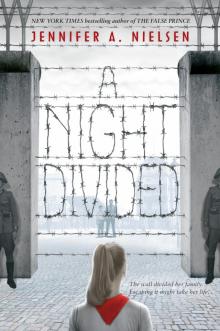 A Night Divided
A Night Divided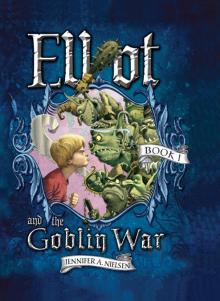 Elliot and the Goblin War
Elliot and the Goblin War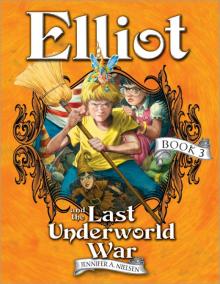 Elliot and the Last Underworld War
Elliot and the Last Underworld War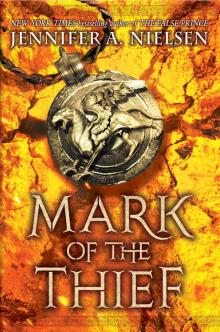 Mark of the Thief
Mark of the Thief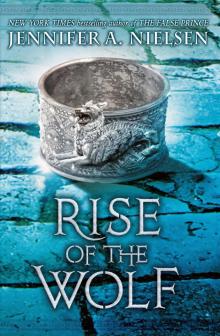 Rise of the Wolf
Rise of the Wolf Elliot and the Pixie Plot
Elliot and the Pixie Plot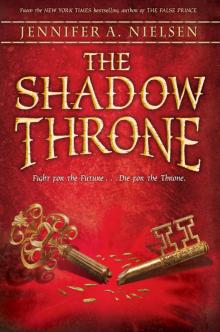 The Shadow Throne
The Shadow Throne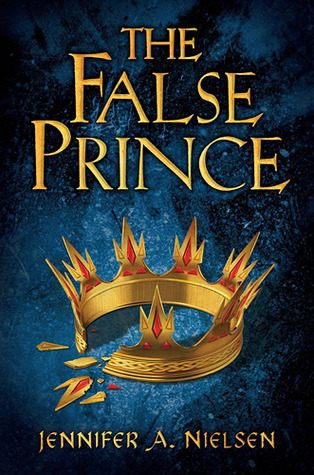 The False Prince
The False Prince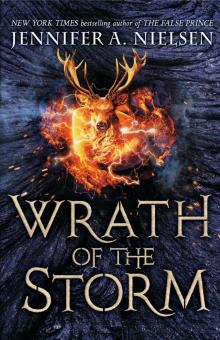 Wrath of the Storm
Wrath of the Storm Deadzone
Deadzone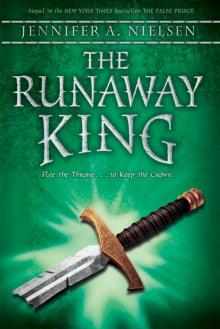 The Runaway King
The Runaway King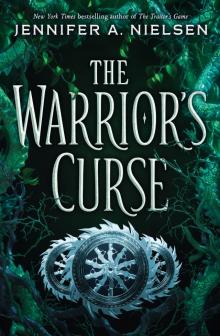 The Warrior's Curse
The Warrior's Curse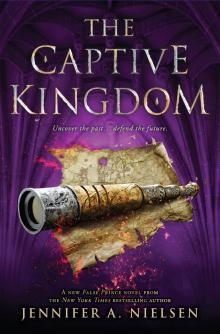 The Captive Kingdom
The Captive Kingdom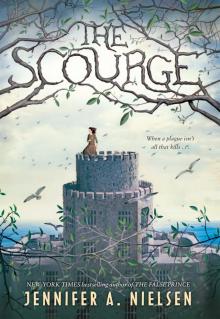 The Scourge
The Scourge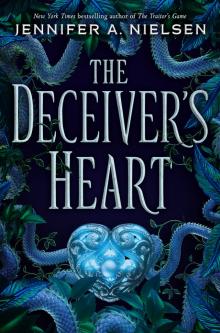 The Deceiver's Heart
The Deceiver's Heart Resistance
Resistance